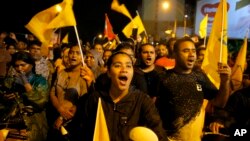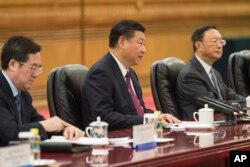India welcomed the surprise victory of the opposition in the Maldives' recent presidential polls. Analysts say New Delhi now has an opportunity to regain the influence lost after the tiny strategic Indian Ocean archipelago leaned heavily toward China.
The elation was evident in India — the first country to "heartily" congratulate Ibrahim Mohamed Solih, the opposition candidate who swept the polls.
Indian Prime Minister Narendra Modi called him as soon as results were confirmed Monday. India's Foreign Ministry said the two agreed "to further strengthen the close, friendly, and good neighborly relations."
A prominent legislator of the Maldivian Democratic Party also said one of the new government's first priorities after taking power would be to reset ties with India.
"Our president-elect has been a strong advocate of the "India first" policy," Eva Abdulla told VOA from the capital, Male.
Analysts said the outcome of the presidential race brought relief to India, which had been sidelined by the outgoing administration of Abdulla Yameen.
Yameen had sealed major infrastructure projects with China, signed a free trade agreement with the economic powerhouse and joined its ambitious Belt and Road initiative — a major infrastructure development project throughout the region.
Relations between India and the Maldives reached their lowest point earlier this year when New Delhi opposed Yameen's crackdown on his political rivals. His administration later asked New Delhi to take back two military helicopters along with Indian personnel posted there, saying they were no longer needed.
Those helicopters and personnel are likely to stay, according to analysts.
"Such issues will now be quickly resolved," said Gulbin Sultana, a researcher on the Maldives at the Institute for Defense Studies and Analyses in New Delhi. "The Solih administration will show some kind of sensitivities to India's security concerns."
Providing helicopters, patrol boats, and satellite assistance to countries such as the Maldives has been part of India's naval diplomacy to retain influence in the Indian Ocean, through which major shipping routes lie.
Leaders of the Maldivian Democratic Party, who have been vocal about their concerns regarding deepening Chinese influence in the country, have said the new administration will renegotiate projects Yameen signed onto with China.
Some of these projects, such as an agreement for China to build an Ocean Observation station in the Maldives, raised concerns in India, which fears they could give China a vantage point of an important shipping route in the Indian Ocean.
"Our highest priority will be given to the geopolitical security of the Indian Ocean region and the countries around," said legislator Abdulla.
On Tuesday, China congratulated Solih on his election win. A Foreign Ministry spokesman was quoted as saying China is "willing to work with the Maldives to consolidate our traditional friendship and deepen our cooperation to benefit our two countries and peoples."
Analysts in New Delhi point out that even as the new administration seeks to balance ties with India and China, Beijing's growing footprint in the Maldives is there to stay.
The country already has borrowed hundreds of millions of dollars from Beijing, sparking some concerns about heavy debt. But the analysts say it is not feasible for the Maldives to back out of the projects.
Still, there is optimism in India that it has won back strategic space in the Maldives.
"Even if there is a level playing field, India has an advantage because of proximity and historic ties," said Manoj Joshi at the Observer Research Foundation in New Delhi. "Between the Maldives and India is one of the most important shipping lanes of the world and stability out there affects everyone."
In recent years, India has struggled to retain its traditional influence in its immediate neighborhood as China spends billions of dollars building infrastructure and wooing small nations from Nepal in the Himalayas to the Maldives in the Indian Ocean.
In the Maldives meanwhile, opposition leaders said there is still a "sense of disbelief" at the electoral outcome. With Yameen's main political rivals either in prison or in exile, a victory for him was seen by most as a foregone conclusion.






